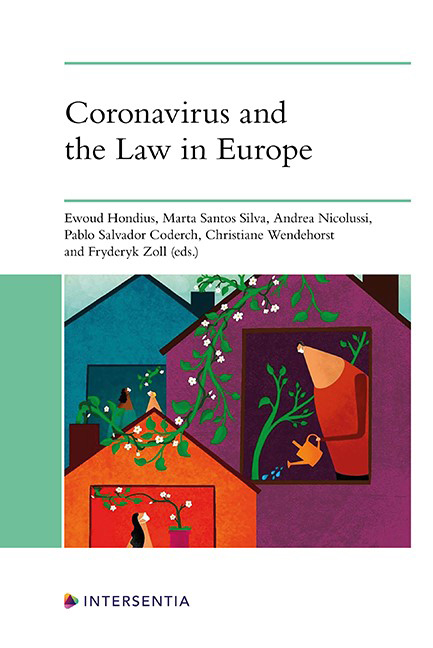Book contents
- Frontmatter
- Preface
- Contents
- List of Keywords
- List of Contributors
- PART I COVID-19 AND FUNDAMENTAL RIGHTS
- PART II STATES AGAINST THE PANDEMIC
- PART III COMPENSATION FOR COVID-19 RELATED DAMAGE
- PART IV CONTRACT LAW
- PART V CONSUMER LAW
- PART VI LABOUR AND SOCIAL LAW
- PART VII CORONAVIRUS CHANGING EUROPE
- Epilogue
- Annex: ELI Principles for the COVID-19 Crisis
- About the Editors
The Impact of the Pandemic Crisis on the Relations between the State and the Regions in Italy
Published online by Cambridge University Press: 10 December 2021
- Frontmatter
- Preface
- Contents
- List of Keywords
- List of Contributors
- PART I COVID-19 AND FUNDAMENTAL RIGHTS
- PART II STATES AGAINST THE PANDEMIC
- PART III COMPENSATION FOR COVID-19 RELATED DAMAGE
- PART IV CONTRACT LAW
- PART V CONSUMER LAW
- PART VI LABOUR AND SOCIAL LAW
- PART VII CORONAVIRUS CHANGING EUROPE
- Epilogue
- Annex: ELI Principles for the COVID-19 Crisis
- About the Editors
Summary
An analysis of the impact of the COVID-19 pandemic on the Italian constitutional order must focus on the relations between the State and the regions during the crisis. The pandemic crisis was a national one, although it affected Italian regions unequally. Furthermore, health care represents the core of regional policies: for this reason, regions almost inevitably came to the forefront during the crisis. This contribution investigates the regional response to the COVID-19 crisis against the background of the relations between the State and the regions. The contribution is divided into three parts. First, it focuses on the most important legal tool during the crisis, the Prime Minister’s decrees, and their impact on the Italian regional model. Second, it focuses on how, in legal terms, the State and regional acts dealing with COVID-19 can coexist. Third, it presents and discusses the measures adopted by the presidents of the regions for this purpose. In doing so, the contribution focuses on three cases: Lombardy, Veneto, and Campania.
INTRODUCTORY REMARKS
In many constitutional democracies, the COVID-19 crisis has triggered peculiar institutional reactions: the executives and their leaders have generally played a strong role, whereas parliaments have been called on to adapt to such a formidable challenge. The measures adopted by the Italian State institutions to face the pandemic crisis are discussed by Michele Massa in ‘A General and Constitutional Outline of Italy’s Efforts Against COVID-19’ in this volume. In this contribution, we will focus on the interaction(s) between the State and the regions during the acute stage of the crisis.
Italian regions were among the key players in the handling of the COVID-19 crisis. This is due to several factors. First, the crisis hit the north of the country much more severely than the south. Although no region has been spared from the COVID-19 pandemic, territories throughout the country have been unequally affected. Consequently, institutional reactions were marked by a dialectical relationship between the State Government and regional governments as well as between the regions themselves. Second, regional competences relating to health protection have been a defining feature of the Italian model of regional State for decades. Under Article 117(3) of the Constitution, “health protection” is one of those matters in which “legislative powers are vested in the regions, except for the determination of the fundamental principles, which are laid down in state legislation”.
- Type
- Chapter
- Information
- Coronavirus and the Law in Europe , pp. 301 - 318Publisher: IntersentiaPrint publication year: 2021
- 1
- Cited by



